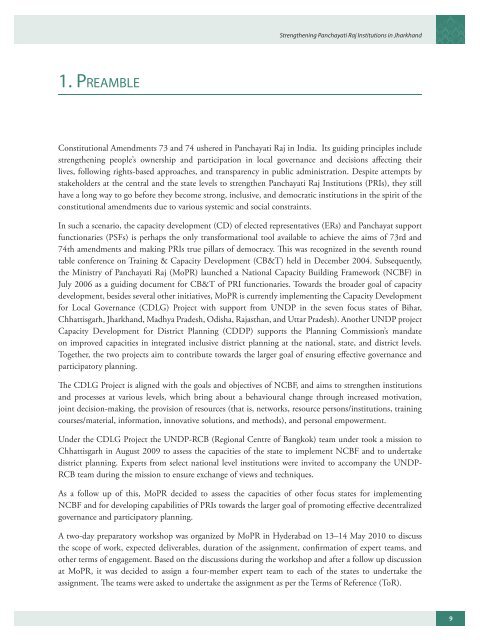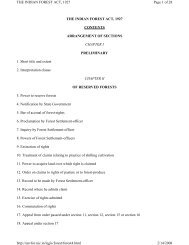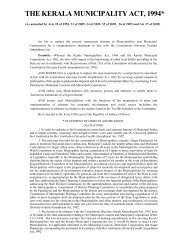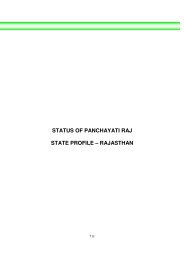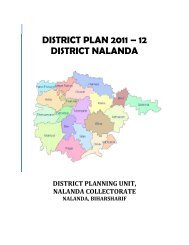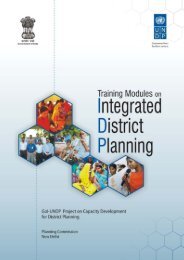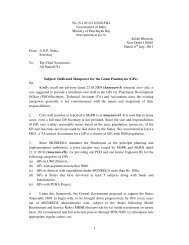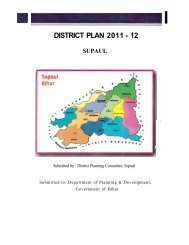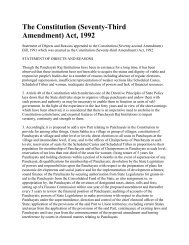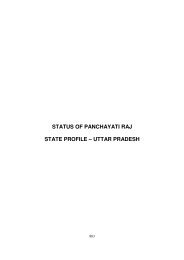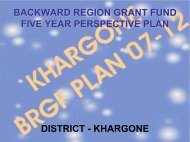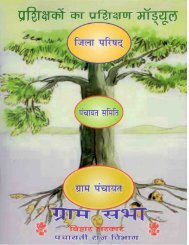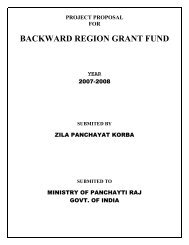for Strengthening Panchayati Raj Institutions in ... - PRI Resources
for Strengthening Panchayati Raj Institutions in ... - PRI Resources
for Strengthening Panchayati Raj Institutions in ... - PRI Resources
You also want an ePaper? Increase the reach of your titles
YUMPU automatically turns print PDFs into web optimized ePapers that Google loves.
<strong>Strengthen<strong>in</strong>g</strong> <strong>Panchayati</strong> <strong>Raj</strong> <strong>Institutions</strong> <strong>in</strong> Jharkhand1. PREAMBLEConstitutional Amendments 73 and 74 ushered <strong>in</strong> <strong>Panchayati</strong> <strong>Raj</strong> <strong>in</strong> India. Its guid<strong>in</strong>g pr<strong>in</strong>ciples <strong>in</strong>cludestrengthen<strong>in</strong>g people’s ownership and participation <strong>in</strong> local governance and decisions affect<strong>in</strong>g theirlives, follow<strong>in</strong>g rights-based approaches, and transparency <strong>in</strong> public adm<strong>in</strong>istration. Despite attempts bystakeholders at the central and the state levels to strengthen <strong>Panchayati</strong> <strong>Raj</strong> <strong>Institutions</strong> (<strong>PRI</strong>s), they stillhave a long way to go be<strong>for</strong>e they become strong, <strong>in</strong>clusive, and democratic <strong>in</strong>stitutions <strong>in</strong> the spirit of theconstitutional amendments due to various systemic and social constra<strong>in</strong>ts.In such a scenario, the capacity development (CD) of elected representatives (ERs) and Panchayat supportfunctionaries (PSFs) is perhaps the only trans<strong>for</strong>mational tool available to achieve the aims of 73rd and74th amendments and mak<strong>in</strong>g <strong>PRI</strong>s true pillars of democracy. This was recognized <strong>in</strong> the seventh roundtable conference on Tra<strong>in</strong><strong>in</strong>g & Capacity Development (CB&T) held <strong>in</strong> December 2004. Subsequently,the M<strong>in</strong>istry of <strong>Panchayati</strong> <strong>Raj</strong> (MoPR) launched a National Capacity Build<strong>in</strong>g Framework (NCBF) <strong>in</strong>July 2006 as a guid<strong>in</strong>g document <strong>for</strong> CB&T of <strong>PRI</strong> functionaries. Towards the broader goal of capacitydevelopment, besides several other <strong>in</strong>itiatives, MoPR is currently implement<strong>in</strong>g the Capacity Development<strong>for</strong> Local Governance (CDLG) Project with support from UNDP <strong>in</strong> the seven focus states of Bihar,Chhattisgarh, Jharkhand, Madhya Pradesh, Odisha, <strong>Raj</strong>asthan, and Uttar Pradesh). Another UNDP projectCapacity Development <strong>for</strong> District Plann<strong>in</strong>g (CDDP) supports the Plann<strong>in</strong>g Commission’s mandateon improved capacities <strong>in</strong> <strong>in</strong>tegrated <strong>in</strong>clusive district plann<strong>in</strong>g at the national, state, and district levels.Together, the two projects aim to contribute towards the larger goal of ensur<strong>in</strong>g effective governance andparticipatory plann<strong>in</strong>g.The CDLG Project is aligned with the goals and objectives of NCBF, and aims to strengthen <strong>in</strong>stitutionsand processes at various levels, which br<strong>in</strong>g about a behavioural change through <strong>in</strong>creased motivation,jo<strong>in</strong>t decision-mak<strong>in</strong>g, the provision of resources (that is, networks, resource persons/<strong>in</strong>stitutions, tra<strong>in</strong><strong>in</strong>gcourses/material, <strong>in</strong><strong>for</strong>mation, <strong>in</strong>novative solutions, and methods), and personal empowerment.Under the CDLG Project the UNDP-RCB (Regional Centre of Bangkok) team under took a mission toChhattisgarh <strong>in</strong> August 2009 to assess the capacities of the state to implement NCBF and to undertakedistrict plann<strong>in</strong>g. Experts from select national level <strong>in</strong>stitutions were <strong>in</strong>vited to accompany the UNDP-RCB team dur<strong>in</strong>g the mission to ensure exchange of views and techniques.As a follow up of this, MoPR decided to assess the capacities of other focus states <strong>for</strong> implement<strong>in</strong>gNCBF and <strong>for</strong> develop<strong>in</strong>g capabilities of <strong>PRI</strong>s towards the larger goal of promot<strong>in</strong>g effective decentralizedgovernance and participatory plann<strong>in</strong>g.A two-day preparatory workshop was organized by MoPR <strong>in</strong> Hyderabad on 13–14 May 2010 to discussthe scope of work, expected deliverables, duration of the assignment, confirmation of expert teams, andother terms of engagement. Based on the discussions dur<strong>in</strong>g the workshop and after a follow up discussionat MoPR, it was decided to assign a four-member expert team to each of the states to undertake theassignment. The teams were asked to undertake the assignment as per the Terms of Reference (ToR).9


